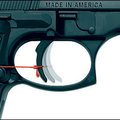DETROIT, April 24 — A quarter century ago, people in this city not only bashed the surging Japanese car companies with words, they also vented their frustration by swinging sledgehammers at Japanese cars, a way for some to raise money for charity (three swings for $1 at one event).
But on Tuesday, when the Toyota Motor Company officially took over bragging rights from General Motors as the world’s largest automaker, the sledgehammers were replaced by finger pointing — at Detroit itself, as well as Japan.
The prospect that Toyota might beat G.M. this year in global sales had been looming for some time, though the prospect still seemed very much in Detroit’s rearview mirror.
G.M., after all, dominates the city — from the G.M. logo atop its offices in the imposing Renaissance Center downtown, to the gift shops selling T-shirts reading “G.M. World Headquarters” and belts made from seat-belt fabric with the G.M. logo on the buckle.
Then Tuesday’s numbers came out. In the most recent quarter, Toyota sold 2.35 million cars and trucks, about 109,000 more than G.M. Save for two periods when G.M. production faltered because of strikes in the 1970s and 1980s, the automaker had been on top since 1931.
As the reality of the historic shift settled in, a sense of resignation was mixed with rhetoric about Japan’s trade policies on newspaper and Internet message boards, at automobile plants and on the radio here. The effect was an extended town hall meeting about what went wrong, and what G.M. should do to regain its global leadership (though it remains the biggest seller in the American market).
“I guess nobody can stay on top forever,” said Walt Novak, 52, who has worked for General Motors for 31 years. “I feel fortunate that I got to be a part of it for a while,” he added, as he stood outside a G.M. engine factory in suburban Romulus, Mich.
Like just about everybody else in this city, Mr. Novak, whose wife, Penny, also works at the factory, had a theory of what had gone wrong. He said Toyota was better at marketing its vehicles to American consumers than was G.M.
That does not ease the pain, however. “There’s something wrong in this country,” he said. “It is pretty demoralizing to us, because we come in every day and work hard.”
That kind of a reaction “tells you how much things have changed,” said Kevin Boyle, a Detroit native and professor of history at Ohio State University who has written about the industry. “Even the real die-hards in Detroit can no longer cling to the idea” that their companies reign supreme.
Deep cutbacks across G.M., the Ford Motor Company and the Chrysler Group mean that Detroit residents “are literally no longer as vested as they were in the industry,” Professor Boyle added.
G.M. officials appear to have mixed views on the importance of losing the “world’s largest” title.
“We’re focused on providing the best cars and trucks for our customers all around the world,” John M. McDonald, a G.M. spokesman in Detroit, said Tuesday. “We’re not focused on a race.”
Yet in January, the company’s chief executive, Rick Wagoner, said he would be disappointed if G.M. lost its leadership position.
“‘I like being No. 1,” Mr. Wagoner said. “And I think our people take pride in that, so it’s not something that we’re going to sit back and let somebody else pass us by.”
In a sense, however, G.M. has done that. One reason Toyota was able to squeeze by G.M. is that the Detroit company, like Ford, is deliberately cutting back on its unprofitable bulk sales to rental car companies, which have helped push down the prices of its cars and hurt their resale value.
As soon as G.M. made clear that it was taking that step, “we knew it was coming,” Paul W. Smith, host of a popular show on WJR-AM in Detroit, said of Toyota’s ascension.
Mr. Smith, whose show has featured interviews with Mr. Wagoner, as well as officials from Toyota and the U.A.W.’s president, Ron Gettelfinger, added: “I think people are getting a sense for how bad it is.”
But Detroiters, he added, often are not aware of how little Americans care about the plight of their city, something he has learned on his regular stints filling in for Rush Limbaugh on his national radio show.
“The rest of the country doesn’t much give a damn about G.M. leading or not leading, the city of Detroit leading or not leading and the state of Michigan leading or not leading,” Mr. Smith said.
Senior Toyota officials have said that they do not believe the company is in danger of a political backlash like the kind that erupted a quarter-century ago.
Though its exports from Japan to the United States have risen for the last three years, the company has emphasized its growing production in America, where it recently broke ground on a new plant in Mississippi and began building Camrys at Subaru’s factory in Indiana last week.
With the latest plant, Toyota will have eight assembly plants in North America. Last year, it built about 1.2 million car and trucks in the United States, or about 54 percent of the vehicles it sold here.
“We have been searching for other ways to produce more cars locally,” Toyota’s chief executive, Katsuaki Watanabe, said recently.
Toyota officials have also stressed the millions in contributions they have made to charities in cities where they have built plants, as well as in Detroit, where Toyota awarded a $186,469 grant to Wayne State University last summer so that 200 high school students could take part in a six-week mathematics camp.
Toyota’s reaction to grabbing the best-seller title? “We look at the results as simply a reflection of how our products are viewed favorably around the world,” said Paul Nolasco, a company spokesman in Tokyo. “We don’t just make them and push them out the door — we have a ‘pull’ system and we build them when they are ordered.”
Toyota’s lead over G.M. comes 50 years after it began selling cars in the United States, starting with the same small cars and pickups it sold in Japan. Toyota then made an important shift in the 1980s when it began developing vehicles for American consumers, like its Lexus luxury cars and an American version of its Camry sedan.
While its growth stalled briefly in the 1990s, when Detroit companies focused on building S.U.V.’s, Toyota surged this decade, with its Lexus lineup and its hybrid-electric Prius.
G.M.’s market share has steadily declined, even though it expanded its brands and its lineup. It had a difficult time in the late 1980s, when it lost five points of market share in a single year when buyers turned away from its lineup of look-alike cars.
G.M., which trailed its competitors in offering S.U.V.’s during the 1990s, caught up early this decade, but gasoline prices began rising. Though it briefly halted its market-share slide, in part because of incentives offered after the September 2001 attacks, G.M’.s sales decline has continued in recent years, despite efforts to remake its lineup.
On message boards, some voiced support for Detroit by criticizing Toyota.
“Toyota takes their profits and invests it in their country, not ours,” a post on the Detroit Free Press Web site said. The author, who used the screen name Americanmade, added, “Wake Up America and Buy American!”
Others showed their support for the Japanese company. “Nice Job Toyota! Your cars are great! Too bad we can’t say that about the Big 3,” said one reader in a posting on the Detroit News Web site Tuesday, signed by R.C. of Kalamazoo, Mich.
Some residents seemed to take a longer view. Richard Graham, 32, whose father works for Chrysler and whose mother used to work for G.M., said the city’s ego should not be bruised by G.M.’s slip to No. 2.
“They’ve been No. 1 for so long — one year out of a century isn’t bad,” he said while strolling along the Detroit River in front of G.M.’s headquarters Tuesday afternoon. “They’re going to do better.”
Yet a G.M. employee, Marvin Wilson, 47, said he and his colleagues were not concerned with being the biggest automaker; they would rather work for a profitable one, he said, even if it means being smaller.
“Don’t get me wrong, I’d love to be No. 1,” Mr. Wilson said. “But it doesn’t affect me that somebody else comes along and takes over that spot. We’ve just got to buckle up and work harder.”






